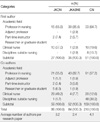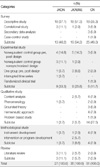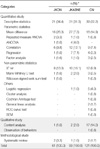Abstract
Purpose
The purpose of this study was to analyze the research papers published in three nursing journals to suggest the direction for Journal of Korean Oncology Nursing (JKON).
Methods
To compare JKON with Journal of Korean Academic Society of Nursing Education and Cancer Nursing, all the research papers published in those three journals, 2010 were reviewed using an analysis criteria developed by the researchers, focusing on type of research, characteristics of authors and subjects, research design, data collection and analysis methods, sample size estimation, and ethical considerations regarding data collection.
Results
JKON lacked research papers which were supported by research funds, produced by multidisciplinary teams, addressing cancer survivors or patients with metastatic cancers, and written in qualitative methodologies. However, JKON showed higher ratio of research papers than the other two journals which were adapted from thesis or dissertations, describing sample size estimation process precisely, and participating subjects diagnosed with various cancers.
Figures and Tables
References
1. 2009 annual report: Cause of death. Statistics Korea. accessed on 15 August 2011. Available at http://kostat.go.kr.
2. Leading causes of death. Centers for Disease Control and Prevention. accessed on 15 August 2011. Avaliable at http://www.cdc.gov/nchs/fastats/lcod.htm.
3. Cancer Nursing home page. Lippincott Williams & Wilkins. accessed on 15 August 2011. Available at http://journals.lww.com/cancernursingonline/pages/default.aspx.
4. KoMCI Journal Web. Korean Medical Citation Index. accessed on 15 August 2011. Available at http://journal.komci.org/ListJournalSum.php.
5. Shin HS, Hyun MS, Ku MO, Cho MO, Kim SY, Jeong GS, et al. Analysis of research papers published in the Journal of the Korean Academy of Nursing: Focused on research trends, intervention studies, and level of evidence in the research. J Korean Acad Nurs. 2010. 40:139–149.

6. Kim HS, Ban JY, Yoon JY, Na YH, Jeon JY, et al. Analysis of research on the nursing of hematology in Korea. J Korean Oncol Nurs. 2010. 10:146–155.

7. Sohn SK, Han YI, Kim KH, Youn SJ. Analysis of cancer nursing research in digestive system in Korea. J Korean Oncol Nurs. 2005. 10:52–62.
8. Choi EH, Chung BY, Kim GD, Kim KH, Byun HS. Literature review of cognitive developmental interventions on patients with breast cancer undergoing chemotherapy. J Korean Oncol Nurs. 2011. 11:26–32.

9. Choi KS, Kim MS, Lee IJ, Han SY, Park JA, Lee JH. Analysis of nursing intervention studies on patients with breast cancer in Korea. J Korean Oncol Nurs. 2011. 11:74–82.

10. Jun MH, Uhm DC, Jeong SH. The analysis of the Korean nursing research trends on complementary and alternative therapies for cancer patients. J Korean Oncol Nurs. 2009. 9:67–75.
11. Oh BJ. An integrative review of oncology nursing research in Korea: 1998-2003. J Korean Oncol Nurs. 2003. 3:112–121.
12. Oh BJ. An integrative review of oncology nursing research in Korea: 2003-2008. J Korean Oncol Nurs. 2010. 10:80–87.
13. Kim JI, Lee EH, Kang HS, Oh HE, Lee EJ, Jun EM, et al. Analysis of published papers by keywords and research methods in the Korean Journal of Women Health Nursing (2007-2009). Korean J Women Health Nurs. 2010. 16:307–316.

14. Bang KS, Lee SO, Park YI, Jun MH, Kim HS, Son HM, et al. Analysis of published papers and their keywords in the Journal of Korean Academic Society of Nursing Education 2007. J Korean Acad Soc Nurs Educ. 2008. 14:244–251.

15. Chung BY, Yi MS, Choi EH. Trends of nursing research in the Journal of Oncology Nursing. J Korean Oncol Nurs. 2008. 8:61–66.
16. The Korean Federation of Science and Technology Societies (KOFST). Editor's workshop for internationalization of journals. 2011. Seoul: KOFST.




 PDF
PDF ePub
ePub Citation
Citation Print
Print










 XML Download
XML Download